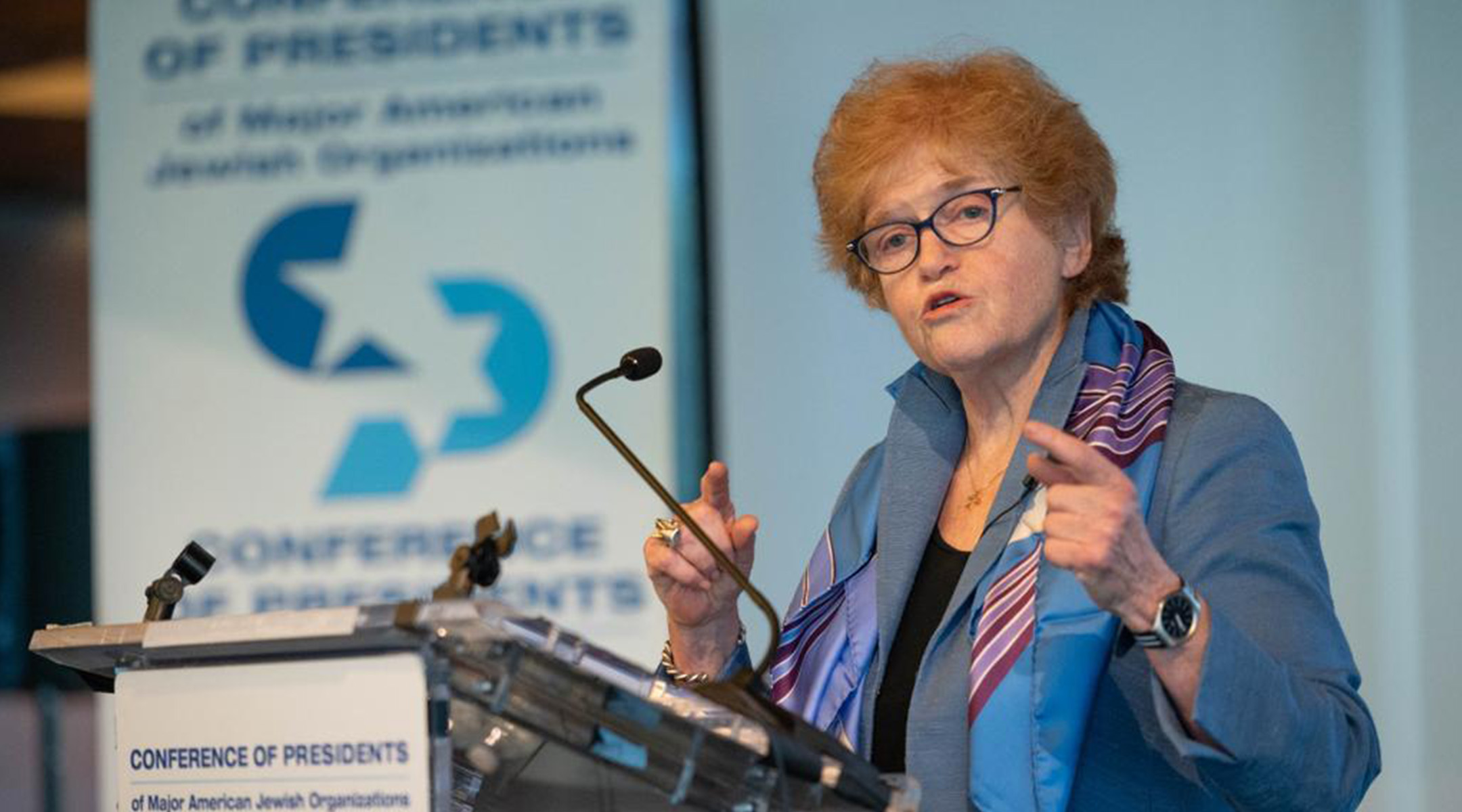Deborah Lipstadt urges New York Jews to ‘bring the joy’ of Judaism despite increased antisemitism
The State Department’s antisemitism envoy tells Manhattan congregation that world leaders increasingly see hatred of Jews as a threat to democracy

Graphic by Angelie Zaslavsky
(New York Jewish Week) — Deborah Lipstadt, the State Department’s antisemitism envoy, is tasked with monitoring discrimination against Jews in countries across the world.
But since Oct. 7, she’s also been paying attention to antisemitism closer to home, in her native New York City, where the NYPD has documented an average spike of over 100% in antisemitic hate crimes reported monthly since Hamas’ invasion of Israel and the ensuing war.
In the past four-plus months, Lipstadt said, she has seen antisemites in the United States and abroad inspire and feed off of each other. She told the New York Jewish Week that in New York City, where she gave a speech to a crowd of hundreds on Tuesday night, she hopes Jews will not begin hiding their identity and “go underground.”
“I think we’re going to be fine, but I hope we won’t dramatically change our lifestyle,” she said in an interview ahead of her talk at Central Synagogue, the large midtown Reform congregation. “I really hope people will not remove their mezuzahs from outside their door.”
She urged the audience at Central to “bring the joy” of Judaism to their lives despite growing antisemitism. “Being Jewish is not something you do defensively,” she said.
“We have to be as much propelled by the pulls as we are enraged by the pushes,” she added, drawing applause from the crowd.
Lipstadt, a renowned Holocaust scholar who has served in the ambassadorial role since 2022, has helped the Biden administration combat antisemitism, including through the administration’s strategy to counter antisemitism, which was rolled out last year before the Oct. 7 attack.
She told the New York Jewish Week that the administration had not changed its approach to combating anti-Jewish discrimination since the attack, but that it had “intensified” its efforts. Weeks after the Hamas attack, the Biden administration met with Jewish leaders to discuss a reported nationwide spike in antisemitism. The White House has prioritized addressing campus antisemitism in particular, and has also expanded Lipstadt’s staff.
Lipstadt said the hatred has become a “two-way street” between the U.S. and Europe, largely due to social media.
“It used to be that what happened in Europe sort of migrated to the United States and now we’re seeing it going both ways,” she said. She also repeated a message she has been advancing for months, predating Oct. 7: that antisemitism is a threat to democracy.
She told the congregation that bad actors, particularly autocratic regimes, are fanning the flames of antisemitism to undermine faith in democracies, and that “all government leaders” agree with that assessment, as do members of the U.S. intelligence community.
When members of the public buy into antisemitic conspiracies claiming Jews control elections, the media or banks, they have “essentially given up on democracy,” she told the audience at Central Synagogue, indicating a loss of faith in the system or that the government cannot ensure their welfare.
She said that trend had become more pronounced since Oct. 7. She highlighted increased antisemitism on social media platforms controlled by the Chinese government, speculating that promoting antisemitic messages could be a way to subvert American interests.
She compared efforts to stoke antisemitism to a “cooking spoon to stir up the pot” of societal discord. If people don’t feel safe due to real or perceived threats, they lose faith in their governing system, she told the congregation.
“If you think you’re a failed state, if you think the government can’t protect you, if you think terrible things are going on, then you feel unstable,” she said.
Lipstadt was in New York for a series of meetings, including on Wednesday at Columbia University’s School of International and Public Affairs. Ahead of the trip to New York, she traveled to Germany for the Munich Security Conference and held meetings in London. Her visit to Central Synagogue and conversation with its rabbi, Angela Buchdahl, was co-sponsored by the synagogue and UJA Federation of New York.
During her visit this month to Europe, she met with American United Nations representatives and U.N. Secretary-General Antonio Guterres, whom she applauded for speaking “passionately” about Hamas hostages and antisemitism. Guterres has come under fire from Israel and its advocates for saying in October that the Hamas attack “did not happen in a vacuum,” as well as repeatedly expressing concern about Israel’s military operations in Gaza alongside his condemnations of Hamas.
Lipstadt decried rhetoric from others in the international community, however, saying recent statements by the U.N. special rapporteur for the Palestinians, Francesca Albanese, were “beneath contempt” and “overtly antisemitic.” Albanese, who once said that the “Jewish lobby” controls the U.S. and has compared Israel to Nazi Germany, said this month that Oct. 7 victims were not targeted because of Judaism, but because of “Israeli oppression.” The statements drew public rebukes from Israel, the U.S., France and Germany.
This article originally appeared on JTA.org.














